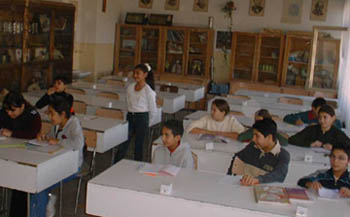Neighborhood Profile
Children in the Ferentari Extension district
live at or below the poverty line, very often
in substandard conditions. Broken families
are the norm, as rates of child abandonment
are high. Rates of abuse and neglect are
equally high. Members of the extended family
tend to live together, with up to eight people
in one room. Children living in these cramped
and often unsanitary conditions face an
increased risk of health problems, as has
been documented by the Philip House staff.
Most of the apartments do not have running
water or heat, which makes the conditions
even more miserable during the winter.
Further, the majority of the children in
this neighborhood do not receive adequate
nutrition; one meal a day, if that, is often
all the children eat.
The neighborhood itself is dangerous, dirty,
and degraded. Many drug dealers and prostitutes
live here, as do a number of thieves and beggars.
Trash piles up in the street and behind the
buildings, and packs of dogs run freely in front
of the apartments.
The prevailing attitude towards education is
negative. The question "why waste time learning
if you can steal and make money now?" is an
unspoken assumption among many neighborhood
residents. The parents themselves usually lack
education and are in no way equipped to help
their children succeed in school.
The neighborhood is also home to a high
percentage of Roma (formerly "Gypsy"). The
rate of poverty among Roma in Romania remains
disproportionately high, due to various
historical factors. Throughout their history
and no less in Romania, Roma have been
marginalized and discriminated against by
the majority, and stereotypes of the "dirty
thief" remain prevalent. Integration of the
Roma into Romanian society can only be achieved
with a concerted effort to counteract a long
history of marginalization. (For additional
background on Roma, see www.rroma.ro).
^ go top
What we offer
 It is precisely within this neighborhood that
Ovidiu and Viorica chose to locate the Phillip
House Day Center, in order to provide critically
needed resources to the children and their
families. Each day the children come to the Day
Center before or after school and spend several
hours working on homework, eating a meal, and
playing with the other children. The Day Center
offers a safe and nurturing environment where the
children can receive the help and love that they
need. Further, the staff strives to develop
relationships not only with the children but
also with their families, which extends the
influence of the Day Center into the larger
community as well.
It is precisely within this neighborhood that
Ovidiu and Viorica chose to locate the Phillip
House Day Center, in order to provide critically
needed resources to the children and their
families. Each day the children come to the Day
Center before or after school and spend several
hours working on homework, eating a meal, and
playing with the other children. The Day Center
offers a safe and nurturing environment where the
children can receive the help and love that they
need. Further, the staff strives to develop
relationships not only with the children but
also with their families, which extends the
influence of the Day Center into the larger
community as well.
In addition, we believe that to best assist
the children and their families, we must
work to strengthen the network of relationships
within the community. To this end, we also work
to develop and further existing partnerships
and collaborations between the Phillip House
and the children and their families, the
community, local schools, and governmental bodies
(City Hall, School Inspectorate, Department for
Child Protection).
^ go top
Day Center Daily Activities

- Free daily hot meal and nutritive supplements
- Assistance with homework from qualified teachers
- Tutoring in specific subjects to improve school results
- Entertainment and/or cultural activities meant
to stimulate creativity, critical thinking and
problem solving, to motivate participation in
competitions with other children, and to instill a
sense of belonging to the community (Arts and crafts;
literature; civic education; physical education;
choir; supervised outdoor games in a safe enclosed
environment)
- Additional recreational activities include field
trips and summer camps
^ go top
Social Assistance
Taking into account the poverty of the assisted
children and their families, we have developed a
variety of services designed to meet their needs.
For the children:
- Provide every child with free school
supplies (notebooks, pens, etc.), art
supplies, shoes and clothing
- Create and update personal records for
each child, which include family background,
school record, medical record, and a
personal/social needs assessment
- Implement an appropriate intervention
strategy based on individual needs
For the families:
- Distribute emergency support for extremely
impoverished families, consisting of food,
clothing and other necessary supplies
- Make regular field visits to the assisted
families to monitor their situation
- Mediate meetings between the child and
members of his/her family, with a focus on
family integration and/or reintegration
- Offer judicial assistance to the parents,
advising them how to obtain identity cards
and how to meet the requirements for health
insurance
- Give up-to-date information about labor
legislation and provide professional guidance
^ go top
Results
The Phillip House Day Center consistently
offers effective community-driven services.
Each child we assist has made encouraging
progress since coming to the Phillip House
Day Center. Children who were formerly
withdrawn and socially isolated now
participate in all the available activities
and have integrated well with the other
children. Those who were on the verge of
dropping out of school now attend regularly
and their grades are steadily improving.
^ go top
|



